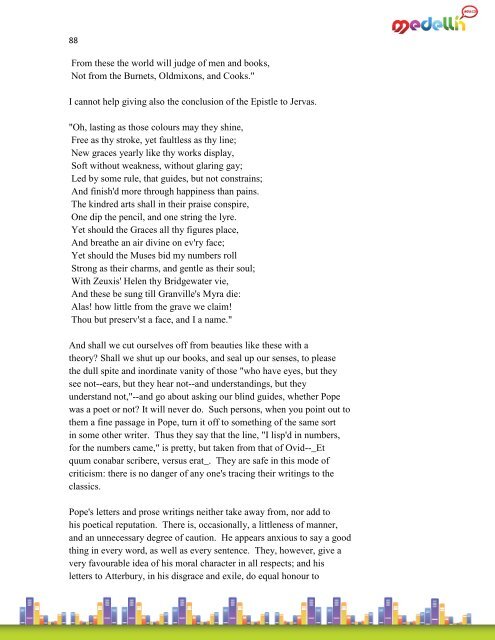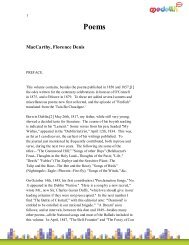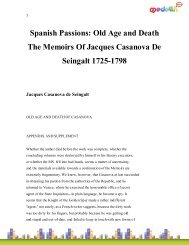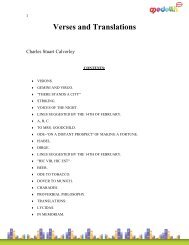Lectures On The English Poets William Hazlitt
Lectures On The English Poets William Hazlitt
Lectures On The English Poets William Hazlitt
You also want an ePaper? Increase the reach of your titles
YUMPU automatically turns print PDFs into web optimized ePapers that Google loves.
88<br />
From these the world will judge of men and books,<br />
Not from the Burnets, Oldmixons, and Cooks."<br />
I cannot help giving also the conclusion of the Epistle to Jervas.<br />
"Oh, lasting as those colours may they shine,<br />
Free as thy stroke, yet faultless as thy line;<br />
New graces yearly like thy works display,<br />
Soft without weakness, without glaring gay;<br />
Led by some rule, that guides, but not constrains;<br />
And finish'd more through happiness than pains.<br />
<strong>The</strong> kindred arts shall in their praise conspire,<br />
<strong>On</strong>e dip the pencil, and one string the lyre.<br />
Yet should the Graces all thy figures place,<br />
And breathe an air divine on ev'ry face;<br />
Yet should the Muses bid my numbers roll<br />
Strong as their charms, and gentle as their soul;<br />
With Zeuxis' Helen thy Bridgewater vie,<br />
And these be sung till Granville's Myra die:<br />
Alas! how little from the grave we claim!<br />
Thou but preserv'st a face, and I a name."<br />
And shall we cut ourselves off from beauties like these with a<br />
theory? Shall we shut up our books, and seal up our senses, to please<br />
the dull spite and inordinate vanity of those "who have eyes, but they<br />
see not--ears, but they hear not--and understandings, but they<br />
understand not,"--and go about asking our blind guides, whether Pope<br />
was a poet or not? It will never do. Such persons, when you point out to<br />
them a fine passage in Pope, turn it off to something of the same sort<br />
in some other writer. Thus they say that the line, "I lisp'd in numbers,<br />
for the numbers came," is pretty, but taken from that of Ovid--_Et<br />
quum conabar scribere, versus erat_. <strong>The</strong>y are safe in this mode of<br />
criticism: there is no danger of any one's tracing their writings to the<br />
classics.<br />
Pope's letters and prose writings neither take away from, nor add to<br />
his poetical reputation. <strong>The</strong>re is, occasionally, a littleness of manner,<br />
and an unnecessary degree of caution. He appears anxious to say a good<br />
thing in every word, as well as every sentence. <strong>The</strong>y, however, give a<br />
very favourable idea of his moral character in all respects; and his<br />
letters to Atterbury, in his disgrace and exile, do equal honour to

















